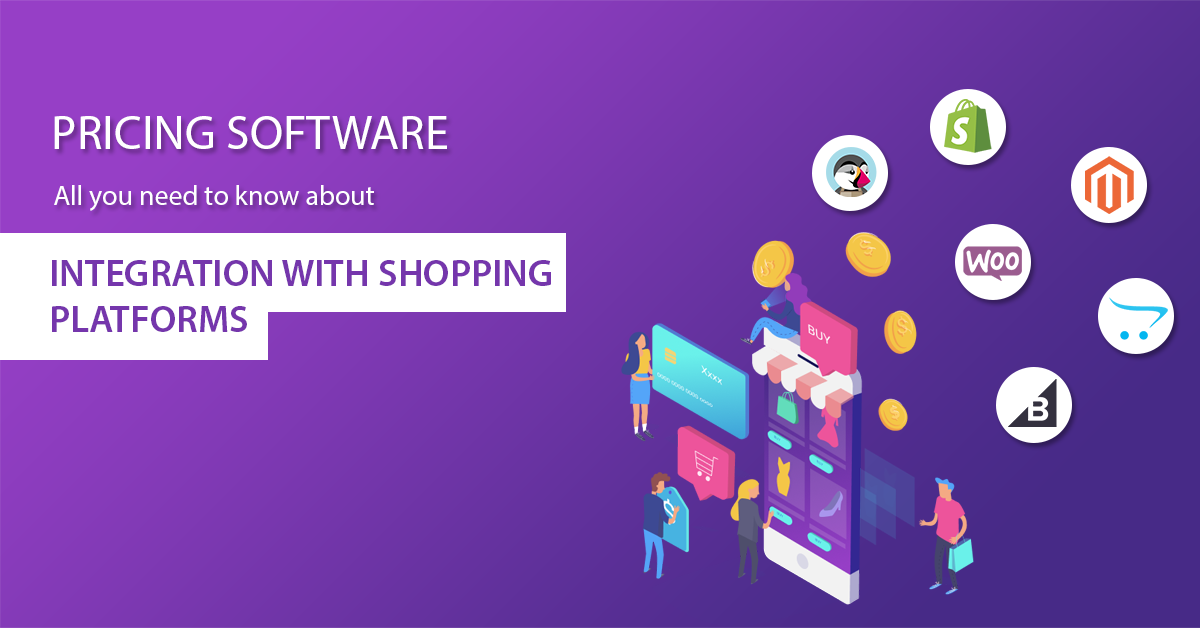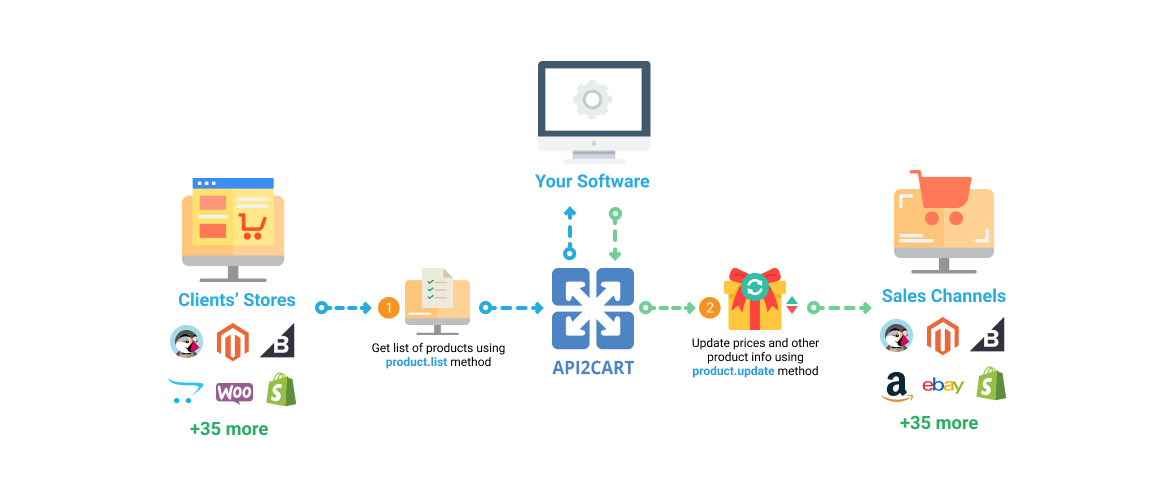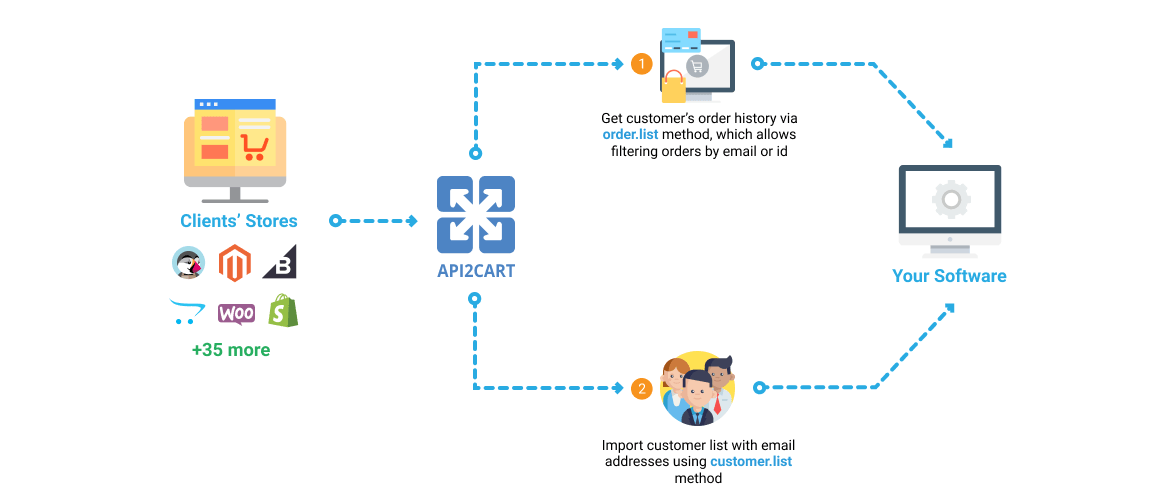
Pricing software integration with shopping carts and marketplaces allows such systems to automate most of its operations connected with prices, currencies, products, customers, etc. Such solutions must receive and manage e-store data to provide the functionality connected with price updates, product tracking, standard and custom reporting, generating coupons.
That’s tons of tech work to do that also involves developing multiple connections, including those with shopping platforms that merchants run their stores on.
Suppose you provide such a kind of solution for online retailers. In that case, you probably are searching for a way that allows you to easily develop the integration with various shopping cart solutions.
In this article, we are going to explore why shopping cart integration is so essential for pricing software and how it is possible to connect with Magento, Shopify, OpenCart, and the other platforms fast and cheaper. We will also discover what difficulties you may face during the development of the integration on your own.
The Importance of Shopping Cart Integration for Pricing Software

Online retailers have to deal with a significant number of operations related to their business activity. Running the e-stores is not a simple task. That is why online sellers are searching for solutions that can help them automate their process and make their lives easier. The difficulty that they face the most is the need to manage the prices of their products continuously. That is why they usually use special pricing software that allows them to change their product prices automatically.
If you are running a pricing software for e-retailers, than you need to be able to retrieve the info from their online stores and process it by your system. For you, as a pricing software provider, the merchant’s e-shop is a valuable asset because that is where the data on prices, currencies, taxes, products, customers, etc. is stored. Having access to such info allows your solution to do the following:
- sync prices across sales channels
- retrieve product lists along with prices, images, descriptions, etc.
- access order history
- create coupons based on a number of conditions
- import contacts from online stores and build segmented lists
- generate smart reports
To be able to get and use the e-stores' data, your pricing software has to be integrated with the shopping platforms used by e-retailers for building their stores. For example, if you want to propose your service to the sellers who have their stores on Magento, you need to develop the integration with this platform. Without a smooth connection with Magento, you won't be able to import and manage the necessary data from stores based on it.
However, the process of integration is not as easy as you might think. It requires a few weeks to investigate the platform architecture and a few more weeks to develop the connection with it. Moreover, integration needs further maintenance and support. Also, it is a quite expensive process because the work of qualified developers costs thousands of dollars per month.
API2Cart can do the hardest part for you. API2Cart makes integration with multiple shopping carts and marketplaces so much easier, faster, and cheaper. The detailed info you can find in the guide below. With its help, you will learn all about what it takes to make your pricing software to retrieve and add data from customers’ stores seamlessly (which are based on different shopping carts and marketplaces).
What Business Cases You Can Resolve Using API2Cart API Methods
API2Cart provides a unified API that allows pricing software like yours to connect with 60+ shopping cart solutions and marketplaces at once. You will be able to access and manage the data from e-stores based on Magento, WooCommerce, Shopify, PrestaShop, BigCommerce, etc.
API2Cart has rich capabilities for pricing solutions. We provide broad functionality for getting and managing all needed info on orders, products, customers, etc. Let’s explore in the details a few examples of operations that your software can do using the API methods providing by API2Cart.
Case #1: Updating the prices across multiple e-retailers' sales channels. With API2Cart, it’s easy to create a single source of pricing truth for retailers who are selling multi-channel. To be able to provide such a function, you need to use product.list and product.update API methods. The product.list method allows getting the list of e-stores' products. The usage of the product.update enables to update price and quantity for a specific product.

Case #2: Analyse online store order history. You can retrieve all the necessary data from your clients' stores and provide your clients with the ability to analyze their store order history and develop effective pricing strategies with your software's help. For doing that, you need to use order.list and customer.list API2Cart API methods. Order.list allows to get online stores' customer orders and filter them by specific parameters. With the help of the customer.list method, you'll be able to import e-stores' customer lists with all the related data like email addresses.

Case #3: Create coupons. API2Cart provides API methods that make it possible for your pricing software to create customized coupons based on several conditions. For that, you will have to use order.list method, cart.coupon.condition.add method and cart.coupon.add method. cart.coupon.condition.add method enables to set conditions to the coupon. Cart.coupon.add method provided by API2Cart allows adding the coupon to the store.

Conclusion
Having dealt with hundreds of integrations, our team has learned the pain points that various web and mobile applications face. With these in mind, API2Cart crafted a unified API that lets your pricing software communicate with clients’ stores, be they based on Shopify, Magento, WooCommerce, or any other shopping cart that we support.
API2Cart provides detailed API Docs, full tech support, flexible pricing plans, and a 14-day free trial period of using the service. Using our service, you will be able to save your time and money needed on multiple shopping cart integration development.
If you want to know more about how to develop your pricing software integration with various shopping cart solutions and marketplaces easily, contact our managers by clicking the button below. We are ready to answer all your questions 24/7.



